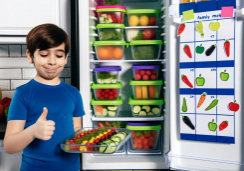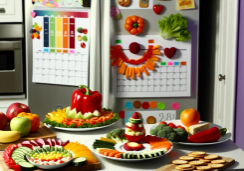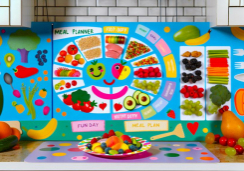Why Choose a Gluten-Free Weekly Meal Plan?
In the era of fast food and instant gratification, you might find the notion of a gluten-free weekly meal plan a bit old-fashioned. Yet, there's a growing awareness that such a diet could be your secret weapon in navigating the complexities of modern-day health concerns.
If you're wrestling with digestive discomfort or facing a diagnosis like celiac disease, you've likely heard that going gluten-free can be a game-changer. But beyond the clear-cut medical advice, there's a world of subtle benefits that might just tip the scales in favor of a wheatless week.
From potentially boosting your energy levels to simplifying grocery shopping, the merits of a gluten-free meal plan are numerous and varied. Stick around, and you'll discover how ditching gluten could not only transform your plate but also how you feel in the chapters of your everyday life.
Health Benefits Explained
Embracing a gluten-free weekly meal plan can alleviate symptoms for those with gluten sensitivities and improve nutrient absorption, thereby enhancing overall well-being. If you're grappling with celiac disease or non-celiac gluten sensitivity, removing gluten from your diet isn't just beneficial; it's essential. Gluten-containing foods can cause inflammation and intestinal damage, leading to a host of uncomfortable symptoms and malabsorption issues.
By adopting a gluten-free diet, you're allowing your body to heal. You'll likely notice a reduction in gastrointestinal discomfort, fatigue, and brain fog, among other symptoms. Moreover, a well-structured gluten-free meal plan ensures that you're getting a balanced intake of nutrients, which might otherwise be compromised by a diet that includes gluten.
However, it's crucial to approach this change with care. Simply removing gluten isn't enough; you must replace it with nutritious alternatives. That's where consulting a registered dietitian becomes invaluable. They can guide you in crafting gluten-free meals that are rich in vitamins, minerals, and fiber, ensuring your diet supports optimal health.
Meal Planning Strategies
Crafting a gluten-free weekly meal plan requires careful consideration of ingredients to ensure your diet remains balanced and nutritionally complete. To maintain your health and simplify your routine, you'll want to plan ahead and strategize your meal prep. Here are three key strategies to keep in mind:
- Outline Your Meals: Start by planning out your daily meals and snacks. This will help you avoid reaching for convenience foods that contain gluten and keep your diet nutrient-dense.
- Identify Gluten-Free Foods: Make a list of gluten-free food options and familiarize yourself with gluten-containing ingredients to prevent accidental consumption.
- Consult a Professional: Work with a healthcare provider or a registered dietitian to tailor your meal plans to your specific nutritional requirements.
Diverse Menu Options
Incorporating a variety of gluten-free recipes, such as zucchini noodles with turkey bolognese or loaded baked omelet muffins, ensures your weekly meal plan remains exciting and nutritionally diverse.
Embracing a gluten-free weekly meal plan not only excludes foods containing gluten, but it also opens the door to a world of diverse menu options that keep your taste buds tantalized and your body nourished.
You'll discover that meals like chili-lime chicken bowls and salmon tacos with pineapple salsa bring a global flair to your dining table, catering to a range of preferences while maintaining a commitment to a gluten-free diet. These dishes aren't just delicious; they're also packed with essential nutrients, emphasizing the importance of variety in your dietary regimen.
Your meal plan will feature food products rich in vitamins, minerals, and other vital nutrients, such as the hearty Greek salad with grilled chicken or the savory black bean and sweet potato enchiladas. Each meal is carefully curated to provide a balanced array of flavors and health benefits.
Shopping and Prep Tips
While discovering the vibrant flavors of dishes like chili-lime chicken bowls and salmon tacos with pineapple salsa, it's crucial to stock your pantry with gluten-free staples to simplify your weekly meal prep. Gluten is a protein found in wheat, barley, and rye, and if you're following a gluten-free weekly meal plan, you must avoid these grains. Planning your shopping and prep ahead of time ensures you have the necessary ingredients for three meals a day throughout the week.
Here are three essential shopping and prep tips:
- Inventory First: Check what you already have, then make a list. This avoids duplication and waste, and ensures you're not missing any gluten-free essentials.
- Advance Prep: Whenever possible, prepare parts of your meals ahead of time. Cooking proteins or chopping vegetables in advance can save precious time during the week.
- Frozen Assets: Don't underestimate the power of frozen gluten-free items. They can be a real time-saver and last-minute lifesaver when you need to pull together a meal quickly.
Is a 7-Day Gluten-Free Meal Plan Worth Choosing for Weekly Meals?
Adopting a glutenfree meal plan for a week can lead to potential health benefits, especially for those with gluten sensitivities. It offers a structured approach to meal prep, ensuring a balanced diet free from gluten-induced discomfort. It’s worth considering for a digestive reset or dietary discovery.
Success Stories Shared
Hearing success stories from individuals who've embraced a gluten-free lifestyle can offer you practical tips and the motivation necessary to navigate your own dietary changes with confidence. These tales often highlight the importance of a balanced meal plan that includes a variety of nutrient-rich foods. Someone might share how swapping traditional bread for a gluten-free option, and incorporating more fruits and vegetables, revolutionized their meals without sacrificing flavor.
Another might tell you about their love for gluten-free Peanut Butter cookies that satisfy cravings while adhering to their diet meal plan. These success stories shared within the gluten-free community can inspire you to find creative solutions that make your meals enjoyable and nutritious.
Moreover, some individuals see weight loss as an added benefit of following a gluten-free Diet Plan, especially when it's well-structured and supervised by professionals in Nutrition and Dietetics. By learning from others, you gain insights into how a gluten-free diet can be tailored to meet personal health goals while ensuring you're not missing out on essential nutrients.
Embracing these narratives, you'll find encouragement and a sense of belonging. Remember, every success story is a testament to the feasibility and potential benefits of living gluten-free.
Frequently Asked Questions
What Are the Benefits of Gluten-Free Meals?
You'll enjoy improved digestion, better skin health, and higher energy levels with gluten-free meals. They aid in weight and allergy management, reduce inflammation, and enhance nutrient absorption, easing chronic pain.
Why Do People Choose a Gluten-Free Diet?
You choose a gluten-free diet for celiac disease management, to improve digestive comfort, and avoid wheat allergies. It's an autoimmune strategy that could enhance skin health and energy levels, not just a trend adoption.
What Is Gluten-Free Diet Pros and Cons?
You'll manage gluten sensitivity and celiac disease with a gluten-free diet, balancing dietary restrictions and nutrient deficiencies while improving digestive health and potentially reducing inflammatory responses, but you may face limited food variety and weight management challenges.
Is It Worth Trying a Gluten-Free Diet?
You might find a gluten-free diet beneficial for your gut health and to reduce autoimmune responses, especially if you've got celiac awareness. Ensure meal diversity and watch for nutritional deficiencies or cross-contamination.
Conclusion
Wrapping up, adopting a gluten-free weekly meal plan isn't just about cutting out gluten—it's a step towards better health. You'll ease digestive woes and potentially manage your weight more effectively.
By strategically planning meals, exploring diverse menus, and prepping smartly, you're set for nutritional success. Remember, the stories of others who've thrived on this path are testament to its benefits.
Stay informed, eat well, and watch your well-being transform.










